Hunter Education
Wildlife Laws Different, But Same Across States
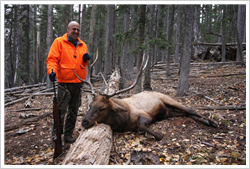

As the holidays come and go, many outdoorsmen will travel with their families and friends to hunt in neighboring states. This presents the hunter with a whole new world of opportunity and risk.
For instance, a Kansas hunter who is used to setting out a bag of corn in order to hunt the deer that come to feed over it will find himself in trouble in both neighboring states of Colorado and Missouri. Colorado, for instance, only allows the use of bait for the taking of furbearers while Kansas allows the use of bait in the pursuit of deer and turkey.
In Missouri, many counties, including those sharing a border with Kansas, have in place "antler restrictions". These restrictions prohibit hunters from harvesting buck whitetail deer with less than four antler points on at least one side. This restriction is the topic of hot debate among big game hunters in Missouri who doubt its effectiveness at producing the large trophy animals as it was intended to do. Deer is illegal under this provision in Missouri, but would be legal just across the county line in Kansas or Nebraska.
Even waterfowl hunting differs from state to state, while being heavily influenced by the federal guidelines. Duck limits differ from state to state, depending on the usual available species and their abundance. Colorado has a daily limit of 5 Canada Geese per hunter and Kansas has a daily limit of 6 per hunter. Even shooting time can be different, with Kansas teal season shooting time being half-hour before sunrise and Missouri’s teal season shooting time being at precisely sunrise.
In short, if you travel to hunt, make sure you research thoroughly the laws of the state you’re traveling to. Even a small violation could ruin an otherwise phenomenal hunting experience. If you’re accused of a hunting violation or receive a hunting ticket, let a Wildlife Lawyer help you keep your voice and give you your day in court. You have rights and a Wildlife Lawyer can help protect them.
Elk Violation
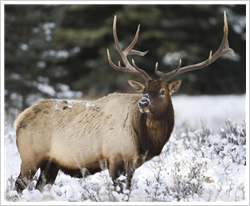

November 1st marks the beginning of the third rifle elk season in Colorado. With only four seasons total, the opportunities to harvest a cow or bull are winding down. The third season will run through the 9th of November with the fourth season starting on the 12th and running through the 16th.
While you may feel a certain desperation to fill that tag, it remains crucial to pay attention to what you are doing in the field. Don’t inadvertently stray outside of your designated unit when you’re hot on the trail of trophy bull. Avoid the temptation to "borrow" your hunting partner’s tag or allow him or her to shoot an animal for you and use your tag. Remember to properly tag your harvest and make use of the meat to the best of your ability. The officers with the Division of Wildlife in Colorado know that corners sometimes get cut during the later part of the season and will be out in force.
It is important to remember that as a hunter, even one accused of a hunting violation, you have rights and a Wildlife Lawyer can help make sure you are afforded those rights. Call our offices to speak to a Wildlife Lawyer about questions you may have if you are given a ticket for a hunting violation.
Conservation Easements
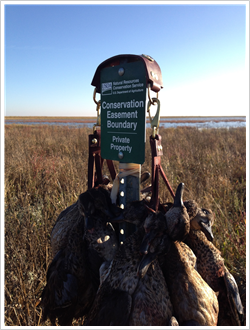

With public hunting access dwindling down in the United States every day, reserving vital ground for hunters and wildlife is more important than ever. Reserve programs like Conservation Easements offer private landowners the opportunity to maintain the integrity of their property and the hunting opportunities available there.
Through a partnership with government agencies like the USDA, private landowners receive incentives to enroll in the Conservation Easement program. Land enrolled in the program is then reserved for conservation purposes. Restricting development, tilling and other agriculture practices, livestock use, and water drainage helps to provide natural, wild habitat where game animals thrive. While these areas are still privately owned by the original landowner, these areas provide the skilled hunter with a unique opportunity to hunt and should not be overlooked when doing your scouting. Make sure to consult with the landowner about any restrictions placed on the land such as where you can drive or if you can plant a food plot for game.
To learn more about enrolling your acreage into Conservation programs and the benefits available for you, contact an attorney with Wildlife Lawyers. It is important to assess the pros and cons in your unique situation and what kind of contribution you wish to make to conservation, and a Wildlife Lawyer can help you make the right choice.
Invasive Species’ Effect on Local Trout
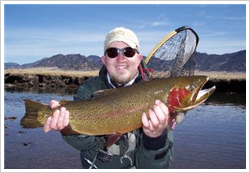

Invasive species are nothing new to hunters. The public has often turned to sportsmen when certain animals move in where they are not supposed to be. Missouri’s response to the increasing wild boar populations has been a policy of "Shoot on Sight," where no matter the season or type of equipment, hunters who see wild pigs are encouraged to harvest as many as possible. When rivers and ponds begin to clog with carp, bowfishing tournaments are a relatively common answer.
Anglers in Colorado are now faced with the arrival of predator fish that are choking populations of trout, as well as other non-game fish in local streams and rivers, as detailed by Scott Willoughby in his recent article in the Denver Post.
A number of endangered fish are at risk of extinction, and while I disagree with Mr. Willoughby about the enthusiasm of outdoorsmen to act to save an endangered species (in friendly discord of course) it is without a doubt the sportsmen who will answer the call to action.
With new regulations concerning certain species of fish that you are likely to encounter on an expedition, it is even more important to double-check the fishing regulations in your area. Game wardens and wildlife officials will take these new rules concerning invasive species very seriously and something as simple as "catch and release" could land you in trouble if you release an invasive species though legally caught.
Teal Opener
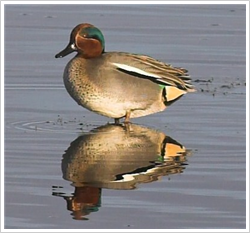

Waterfowl season has officially opened in many states with early Canada goose and teal seasons in full swing. An opportunity to catch those early migrating blue wings and resident geese, September waterfowl seasons are a great way to knock the rust out of your joints and the dust off the decoys. These seasons afford the dedicated waterfowler the chance to find out his waders have sprung a hole in mild-temperature ponds, or that his retriever may need a refresher on casting.
For teal, the shooting is often fast and early. Erratic flocks of "darts with wings" will likely begin buzzing the decoy spread well before shooting time. The squeaky high pitched quacks and splashing around in front of the blind will likely drive the pup crazy after a whole summer of bumpers. Because most areas won’t have had a freeze by opening day of an early teal season, bug spray and even sunscreen are a must. Hunting the Cheyenne Bottoms Wildlife Area in Central Kansas at this time can make you want to put the inventor of DEET on your Christmas list…
Hunting resident Canada geese has its ups and downs. The birds are likely not migrators for one reason or another, and their patterns are pretty set. There is a lot of loafing in cut hay fields and open fields as opposed to heavy feeding in cut corn and milo as late season goose hunter may be used to. In my experience, the calling is a lot less aggressive as well.
Whatever your passion, try to get out for an early season hunt. That friend or kid in your neighborhood who has always wanted to try duck hunting may be more apt to enjoy his or her first time out when the high temp is above 40 degrees.
Remember, early teal and goose, as well as September dove hunting, is migratory bird hunting. Check your state’s regulations for shooting times, daily bag limits, legal species, and required licenses. Some states elect for later shooting times for early seasons and bag limits will likely differ from the regular duck or goose season. For your convenience, the following links for state waterfowl regulations are provided:
Kansas: http://kdwpt.state.ks.us/Hunting/Migratory-Birds
Missouri: http://mdc.mo.gov/hunting-trapping/hunting-regulations/waterfowl-regulations
Colorado: http://cpw.state.co.us/thingstodo/Pages/Waterfowl.aspx
Colorado’s Hunter Education Faces Changes
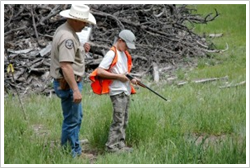

Changes may be coming to hunter education. Do you support the current two-day classroom sessions or a change like the "mentor" program? Let us know what you think.
Colorado’s hunter education could be too much of a good thing
http://www.denverpost.com/outdoors/ci_23764001/colorados-hunter-education-could-be-too-much-good
Mentoring
My grandson, John, who just turned 12 at the beginning of the year and just old enough to start hunting big game, took a week off school to hunt javelina with me here in Arizona. It was quite a trip for him as it was his first time flying alone (he came from Colorado) and his first big game hunt. His prior hunting experience was tagging along on his grandmothers mule deer and antelope hunts with a few dead chipmunks’ of his own thrown in.
The week started out with a storm that brought 3 inches of rain, not totally out of the ordinary but a lot for the Arizona desert none the less. The good thing is that any tracks we would find while hunting would be very fresh.
We started out in a new area, new to me anyways, and covered nearly five miles the first day. We were onto fresh tracks right from the truck. Well five days later we were still following tracks but were never able to catch up the elusive little pigs.
John and I had a great time that week, we discovered a cave, he learned some tracking skills, and we or mostly I napped in some of the most beautiful country to be found. We covered nearly twenty miles that week looking for javelina talking and laughing a lot and just enjoying being out in God’s creation.
I’m sure John was disappointed that he didn’t get to shot at a javelina but I explained to him that is why we call it hunting and that we had a lot of years of hunting ahead and would surely get one next year.
Mentoring the next generation of hunters pays dividends throughout the youngster’s life in that it instills an appreciation for wildlife and conservation of the land they live on. It gets them away from their video games and out of the house for a few hours teaching them skills that have been used since Cain and Abel.
Mentoring is not just for the young hunter, it really does bring joy to us older hunters who take the time to take a youngster out and teach them the necessary skills they need to become sportsmen. Do yourself a favor and take someone new to the sport out hunting.
Dangerous Gun Bill
For all of us outdoorsmen who possess firearms this is a MUST READ!
Have any of you ever borrowed a gun or loaned one to someone to use? If the recent Bill proposed in Congress is passed you and the other person may both end up in jail! I am not kidding, you have to read the article by Senator Greg Brophy in today’s Denver Post.
The article also touches on an idea of a "gun registry". In other words, the government wants us to give them a list of each and every gun we own so they can verify that we "law abiding citizens" have a right to possess it. I have posted a link to the article below. Start making some noise gun owners or we may not be gun owners for much longer!
Chad M. Biggerstaff, Esq.
http://www.denverpost.com/opinion/ci_22673810/gun-bill-dangerous-unnecessary
Colorado Sportsmen to have their say with the new CPW
Here’s the link to the article by Scott Willoughby at The Denver Post:
Colorado sportsmen get opportunity to have their say – The Denver Post
[Excerpt] "Beginning with the Northwest Regional Sportsmen’s Caucus taking place at 6 p.m. Wednesday in Grand Junction, CPW is embarking on a new era of community outreach, offering hunters and fishermen an opportunity to provide input on wildlife management issues in Colorado. Active hunters and anglers within the state’s four regions will meet to discuss pertinent local wildlife issues with managers, biologists, and agency officials, and will be asked to select two delegates from each region to represent wildlife concerns at the newly formed Sportsmen’s Roundtable meeting for the first time in Denver next month."
Jeffery L. Weeden, Esq.
OHV Fines Increased
On a recent elk hunt I was sitting in my stand, late opening morning, enjoying the peace, quiet, and unusually warm weather, for a November at over nine thousand five hundred feet, when suddenly my serene moment was destroyed as an off highway vehicle(OHV) rolls up the tree line and parks directly across the valley from me. Spending the day sitting on a stand enjoying the beauty that is our Colorado mountains with no phones, televisions, computers, cars, trucks, or other noises that we live with in the city everyday is one of the reasons we get away every year to these secret peaceful hideaways. To have that moment taken from me by someone on an OHV, seeing the damage being done to the habitat and knowing any opportunity for game has been eliminated made me wish for tougher penalties for those who abuse the OHV rules.
The Bureau of Land Management (BLM) has heard the voice of sportsmen who know the importance of protecting habitat and quiet places on our wild public lands by increasing the minimum fines and escalating fines for repeat offenders.
Changes recently made for Colorado BLM Land include:
- Minimum fines increased from $50 to $250.
- Escalating fine structure which includes $250 for 1st offense, $500 for 2nd offense and a mandatory appearance for 3rd offense.
These recent changes are a significant step in the battle to reduce OHV damage to the habitat and the wild country we love to fish and hunt.
Chad M. Biggerstaff, Esq.
